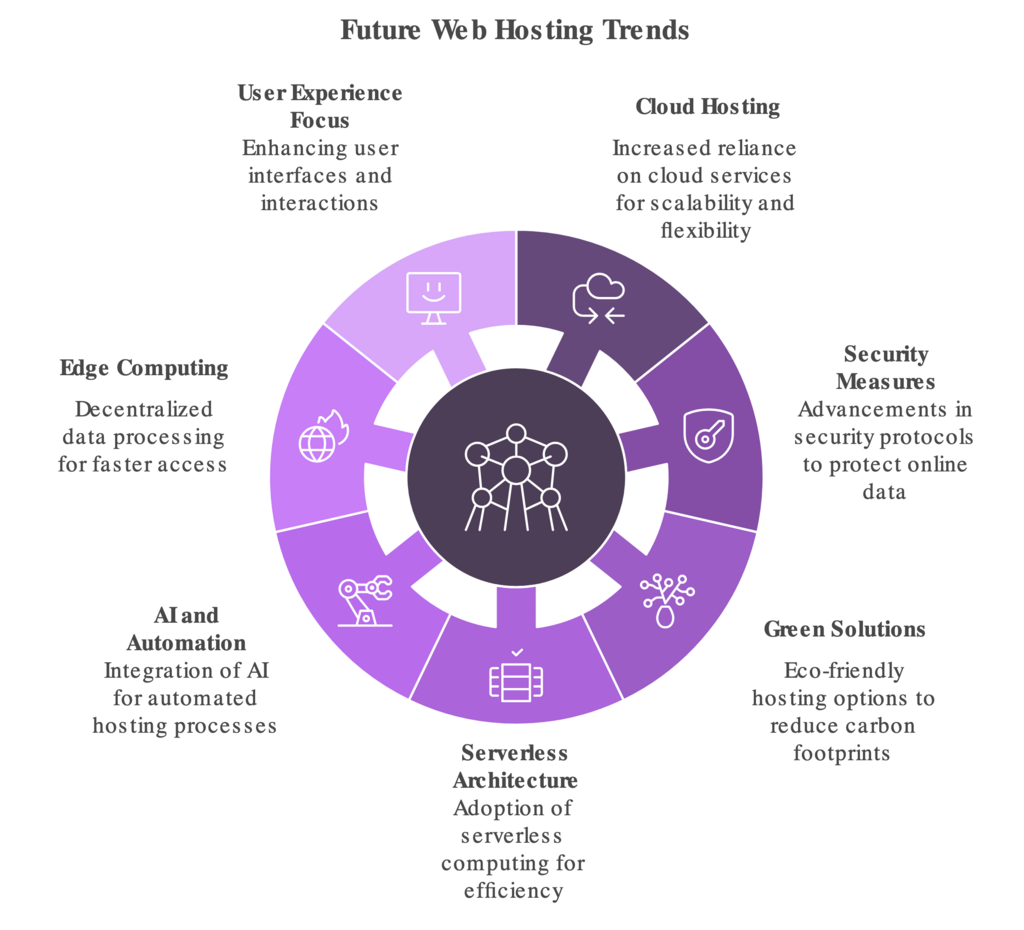In this document, we explore the anticipated developments in web hosting, examining emerging technologies, evolving user needs, and industry trends that are likely to shape the future landscape of web hosting services. As the digital world continues to expand, understanding these predictions can help businesses and individuals make informed decisions about their online presence.

Cloud hosting is expected to dominate the web hosting market as businesses seek scalable
and flexible solutions. The ability to easily adjust resources based on demand will become
increasingly important, especially for businesses experiencing fluctuating traffic. This shift will
lead to more providers offering hybrid solutions that combine cloud and traditional hosting.

With the rise in cyber threats, security will be a top priority for web hosting services. Future
hosting solutions will likely incorporate advanced security features such as AI-driven threat
detection, automated backups, and enhanced encryption protocols. Hosting providers will
need to prioritize security to build trust with their customers.

As environmental concerns grow, the demand for eco-friendly web hosting solutions will
increase. Providers that utilize renewable energy sources and implement energy-efficient
technologies will attract environmentally conscious consumers. This trend will push the
industry towards more sustainable practices.
This article explores the scientific and technological trends shaping the future of the internet and how they will impact society.

The adoption of serverless architecture is predicted to rise, allowing developers to focus on
code without worrying about server management. This model will streamline the
development process and reduce costs, making it an attractive option for startups and small
businesses.

Artificial Intelligence (AI) and automation will play a significant role in the future of web
hosting. From automated customer support through chatbots to AI-driven resource
management, these technologies will enhance user experience and operational efficiency.
Hosting providers that leverage AI will likely gain a competitive edge.

As the demand for faster load times and improved performance increases, edge computing
will become more prevalent. By processing data closer to the user, hosting providers can
reduce latency and enhance the overall user experience. This trend will be particularly
important for applications requiring real-time data processing.

The future of web hosting will see a greater emphasis on user experience. Providers will
need to offer intuitive interfaces, comprehensive support, and customizable solutions to
meet the diverse needs of their customers. Enhanced user experience will be a key
differentiator in a crowded market.

The future of web hosting is poised for significant transformation driven by technological
advancements and changing user expectations. By staying ahead of these trends, businesses
can ensure they choose the right hosting solutions to support their growth and success in the
digital landscape. As we move forward, adaptability and innovation will be crucial for web
hosting providers to thrive in this evolving environment.

HostArmada. (2024). The top game-changing web hosting trends for 2025. https://www.hostarmada.com/blog/the-top-game-changing-web-hosting-trends-for-2025/
Listifye. (2024). Top web hosting trends for 2025. https://listifye.com/top-web-hosting-trends-for-2025/
SternHost. (2024). Emerging trends in web hosting for 2025 and beyond. https://sternhost.com/emerging-trends-in-web-hosting-for-2025-and-beyond/
NovoServe. (2024). Web hosting trends for 2025: Sustainability, AI, and enhanced server performance. https://novoserve.com/blog/web-hosting-trends-for-2025-sustainability-ai-and-enhanced-server-performance
Acreage Technologies. (2024). Shaping the future of web hosting: Top trends for 2025. https://www.acreage.tech/shaping-the-future-of-web-hosting-top-trends-for-2025/
New text element